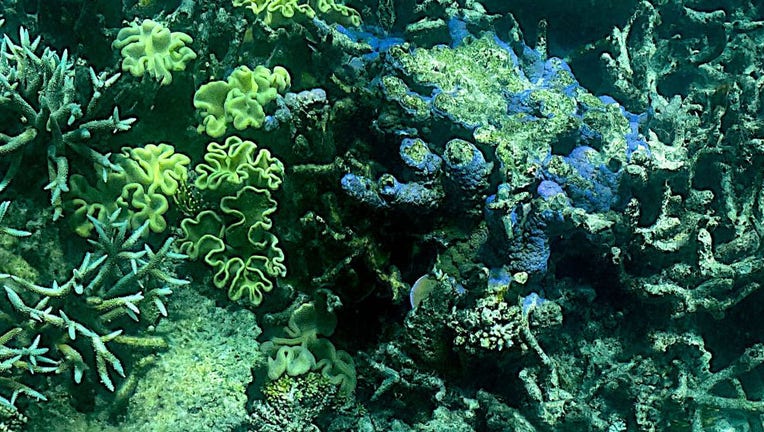Great Barrier Reef suffers widespread coral bleaching due to high ocean temperatures

Photo shows the condition of the coral on the Great Barrier Reef, off the coast of the Australian state of Queensland. - The Great Barrier Reef has been hit with "widespread" bleaching. (GLENN NICHOLLS/AFP via Getty Images)
CANBERRA, Australia - Australia’s Great Barrier Reef is suffering widespread and severe coral bleaching due to high ocean temperatures two years after a mass bleaching event, a government agency said on Friday.
The report by the Great Barrier Reef Marine Authority, which manages the world’s largest coral reef ecosystem, comes three days before a United Nations delegation is due to assess whether the reef's World Heritage listing should be downgraded due to the ravages of climate change.
"Weather patterns over the next few weeks will be critical in determining the overall extent and severity of coral bleaching across the Marine Park," the authority said.
"Bleaching has been detected across the Marine Park — it is widespread but variable, across multiple regions, ranging in impact from minor to severe," the authority added.
The reef has suffered significantly from coral bleaching caused by unusually warm ocean temperatures in 2016, 2017 and 2020. The previous bleaching damaged two-thirds of the coral.
The environmental group Greenpeace said the severe and widespread coral bleaching suffered during a La Niña weather pattern that is associated with cooler Pacific Ocean temperatures was evidence of the Australian government’s failure to protect the coral from the impacts of climate change.
RELATED: Climate change has killed half of the Great Barrier Reef's corals, study finds
"This is a sure sign that climate change caused by burning coal, oil and gas is threatening the very existence of our reef," Greenpeace Australia Pacific Climate Impacts Campaigner Martin Zavan said in a statement.
In July last year, Australia garnered enough international support to defer an attempt by UNESCO, the United Nations’ cultural organization, to downgrade the reef’s World Heritage status to "in danger" because of damage caused by climate change.
But the question will be back on the World Heritage Committee’s agenda at its next annual meeting in June.
A U.N. delegation will inspect the reef’s health next week.

